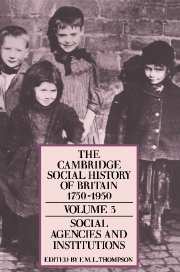Book contents
1 - Government and society in England and Wales, 1750–1914
Published online by Cambridge University Press: 28 March 2008
Summary
The theme of this chapter is the manner in which Government influenced the lives of citizens of England and Wales, their behaviour and conditions of life according to which principles and with what effects. A central assumption – widely shared for a substantial portion of the period, most fully developed in the ideas and actions of Peel and Gladstone, though with earlier roots, and most dominant from the 1840s to the 1870s – was that the government's role was at most strictly limited, that it not only should not but could not determine the structure and working of society. Rather its role was to provide a firmly established and clearly understood framework within which society could very largely run itself.
Even in the mid-Victorian period the reality of government action did not wholly match this ideal, but it was widely enough shared at all social levels for government transgression of it long to require justification against challenges. It had distinctive institutional effects. In contrast with most other societies of the period in England and Wales, many of the functions performed by central government elsewhere were, throughout the period, performed by groups of self-governing citizens either on an elective, but unpaid, official basis, as in the various institutions of local government, or through voluntary associations. Though Britain certainly possessed highly effective central government institutions, unlike other European countries she did not develop in the nineteenth century a strong bureaucratic stratum with powerful interests of its own, a strong set of popular expectations of the role of the state or a sense of popular identification with it.
- Type
- Chapter
- Information
- The Cambridge Social History of Britain, 1750–1950 , pp. 1 - 62Publisher: Cambridge University PressPrint publication year: 1990
References
- 11
- Cited by



